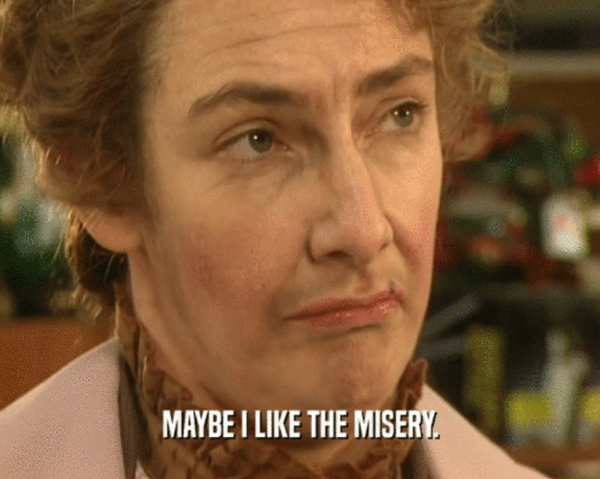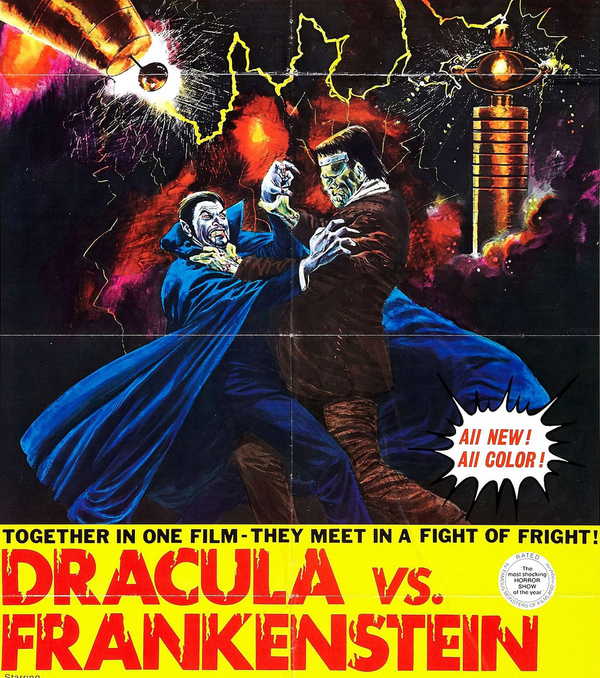The Gist: News of the World
England, Canada and Australia, all with election results in a week? This is the Gist.

After our very Extra explanatory exegesis last time, let's try something different. Instead of thousands of words covering hundreds of years we'll just run around quickly looking at things that happened this fortnight.
Canadian Elections
It is a painful truth that as the generations turn, Irish people abroad just get worse and worse. Our national charms and empathy fade leaving only our worst instincts for malice and cunning. This is why Irish-Americans surround Trump while he is as popular as aging mackerel sewn into curtains back in their ancestral home.
So it is is with some relief that we discovered the Irish-monikered winner of the Canadian election, Mark Carney, is sufficiently close to our actual country that he'd held an Irish passport since the 1980s and could still be called up to play in any future soccer internationals.
But while his win was notable and impressive, it was mostly a result of other people's actions. Specifically, Donald Trump's rhetorical denials of Canada's independence and the fact that his opponent, Tory party leader Pierre Poilievre was a personally repellent Trumpist.
Trump has claimed to have a Midas touch, an uncharacteristically accurate self-assessment, in that everything he touches dies. So it was with the polling numbers for Canada's Tump tribute act as soon as the US president returned to office.
Cue the chart!
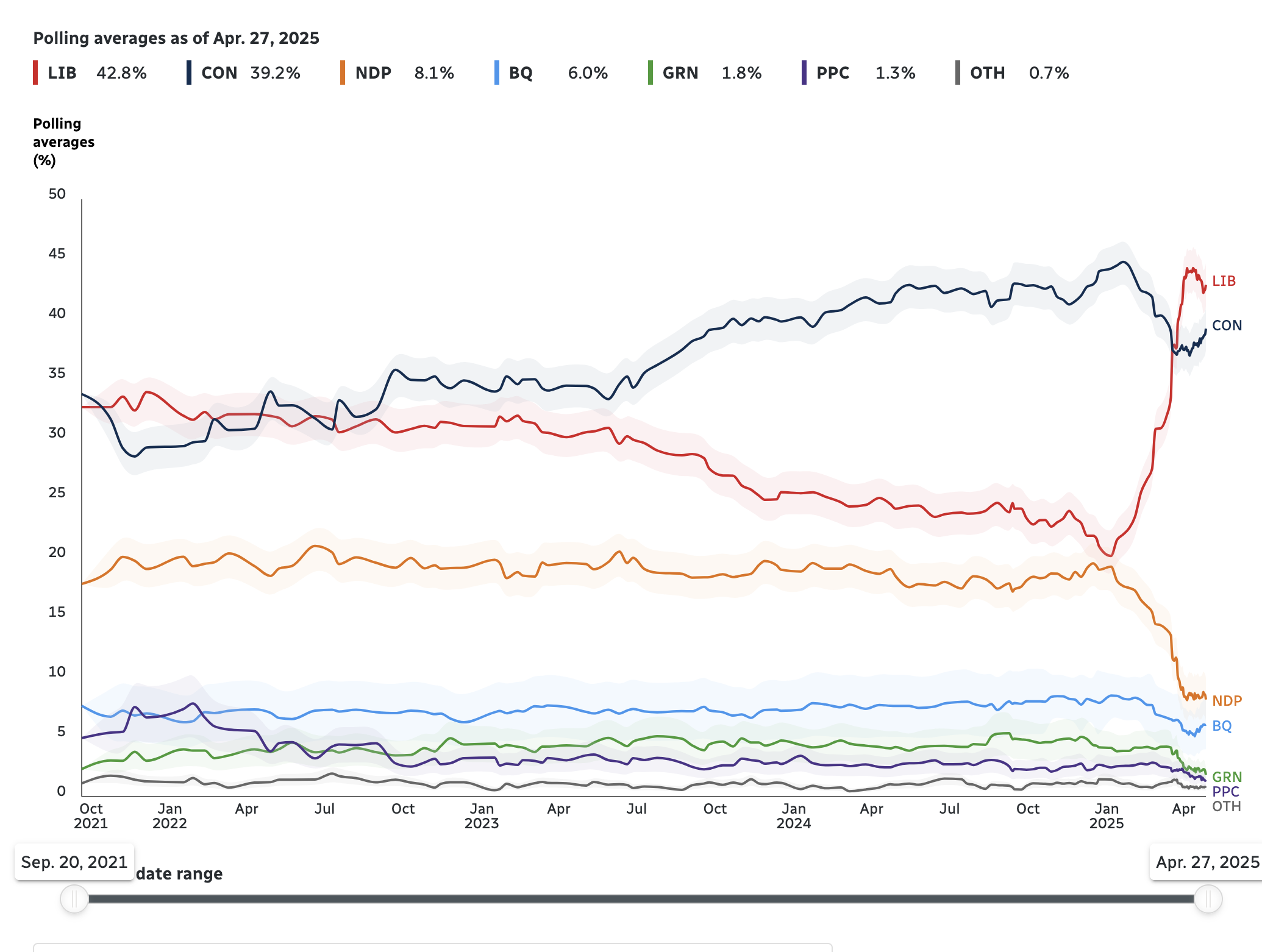
There's barely any time to tell you about Poilievre's ostentatious embrace of crypto, his minimal reskinning of Trump's America First slogan as Canada First or his backing for a Freedom Convoy of anti-vaccine truckers that blocked the streets of his own constituency’s voters in Ottawa.
We can just note that, on top of losing the national election, he managed to so annoy the sleep-deprived residents of his own electoral district with his honking horn for truck-fuelled anti-science that they turfed him out of his own seat.
Australian Elections
It was déjá vu all over again at the Australian elections, as the previously leading conservative Coalition faced the consequences of giving off enthusiastic Trumpy vibes after the start of the Tariff Times.
Chart!
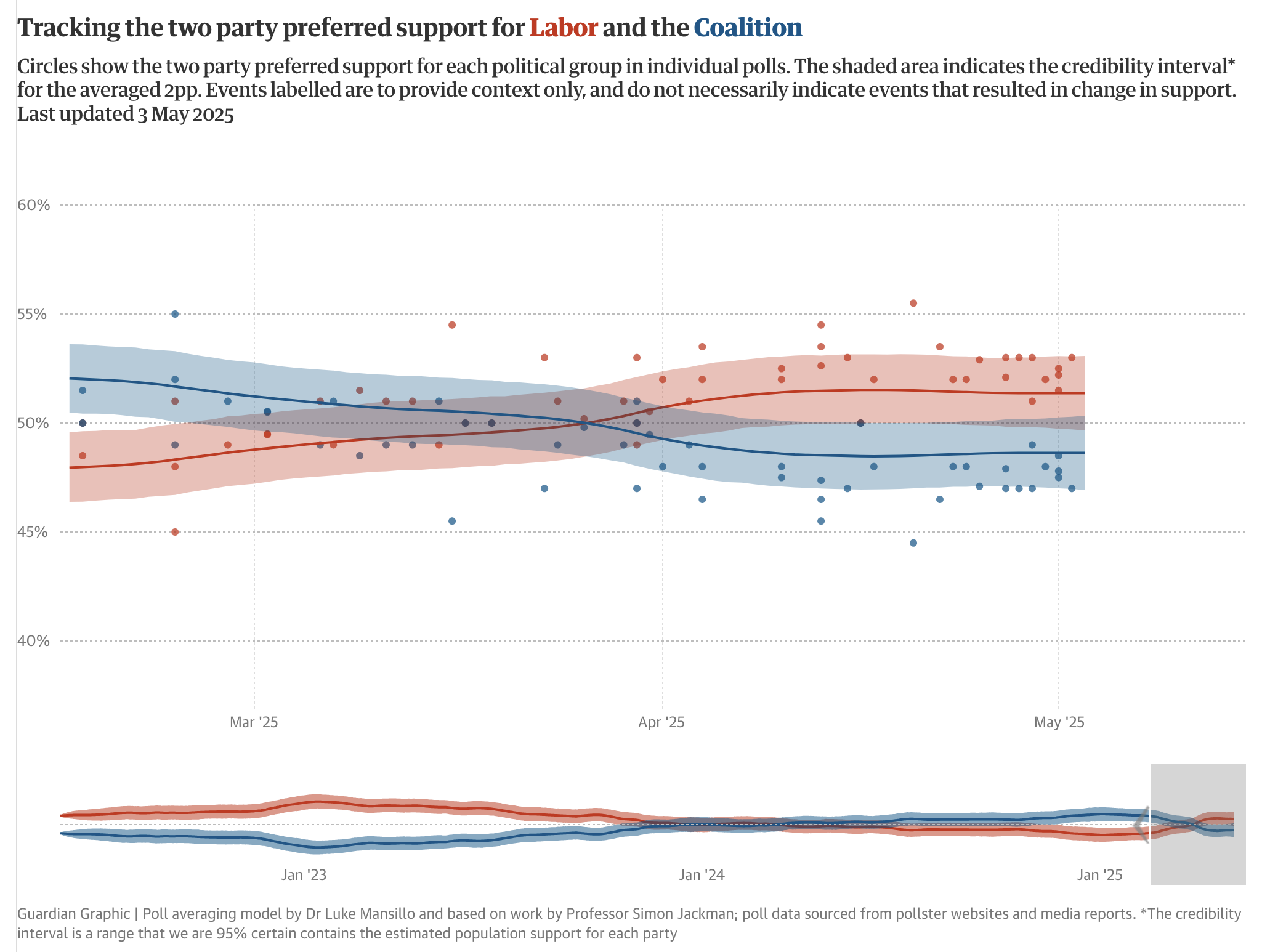
Reinforcing the messaging of the Canadian elections, we even had a personally objectionable right wing Liberal party leader, Peter Dutton, whose frontbench senators explicitly made speeches declaring a Make Australia Great Again policy.
Australians were unconvinced, re-electing the incumbent government that had been trailing the opposition group's promises to introduce DOGE-aping massive job cuts in public servants, until Musk and Trump demonstrated what chaotic vibe-coded government would actually mean.
Oh, and then the Dutton led his party to it's lowest modern seat result and lost his own seat. Listen, it's almost like there's some sort of lesson to be learned here.
UK Local & By-Elections
There were three stories happening at once in England's elections this week. The main one was that Nigel Farage's latest personal political vehicle, Reform UK, surged to startling success, taking both a By-election seat directly from Labour and a wall of Local Council seats.
Bring on the Chart!
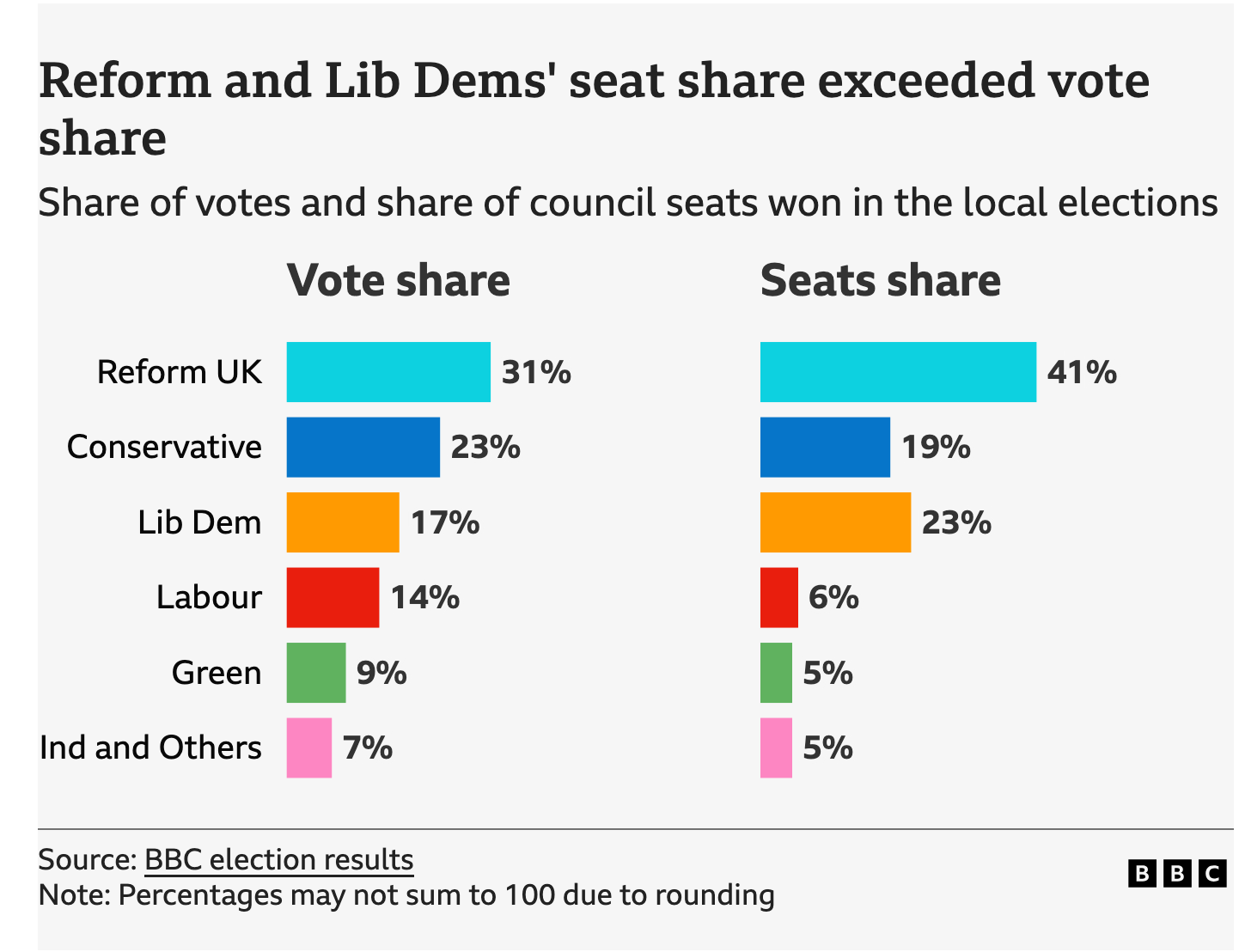
While it may seem strange that Nigel Farage, the answer to the question 'what if nicotine-stained fingers became a whole person?', would buck the international trend against Trumpist rightwing populism we should remember that all these votes were cast in England, not the UK as a whole.
More to the point, only some of the constituencies were voting. And the ones that were up for grabs were overwhelmingly Tory-blue.
Which takes us to the second story of this election. The UK Tory party is imploding and has no plan to change its trajectory. The Financial Times, a pretty sober outlet, summed up the results starkly: "The world’s most successful party is currently losing a fight to the death."
Of the 21 Councils changing control fully 18 of them were the Conservatives losing to either Reform outright or slipping out of their control. Only one council switched from Labour control.
In a first-past-the-post system, electorates are forced into binary choices to allocate power. And chunks of the former Tory party electorate simply won't vote for them any more. Hence, Reform.
The third, and perhaps biggest, story from this election is the continuing inability of the Labour Party to understand its own electorate. Labour has spent its time since election studiously signalling to all those Reform voters that it, too, can be cruel and racist. It has cut fuel allowances for old people, attacked trans people, demonised immigrants and generally gone out of its way to sound like the least popular member of your pub quiz team. In fact, it was even outflanked to the left by Wetherspoons after the UK SC decision on trans people.
In short, the Labour party has expended considerable political capital driving away its own base to the left, sending support to the Greens in national polls and lifting the Liberal Democrats into second place by seats won in this election, while winning exactly zero support from people who were never going to vote for it anyway.
Unlike our other two stories, which are basically the same narrative of the Tory party's collapse from different ends of the telescope, this one is a purely self-inflicted wound by the Labour Party leadership.
The explanation is a question of the UK's political culture, rather than any electoral strategy by the Labour Party. Firstly, the current Labour leadership was defined and took power in opposition to the left. Jeremy Corbyn's leadership was its main antagonist, even while Brexit consumed the Tories.
Secondly, the UK media has been on a long collective march to the right for decades. The creation of the Murdoch Press as a bloc has driven and shaped the UK political classes more than almost any other factor. During the time all of the people around Kier Starmer grew up, the more right-wing position has always been presented as the reasonable and popular one. This has a long-term effect, constraining political conceptions of what might be imagined, let alone delivered.
But, now that they have achieved stunning majority power, the Labour Party continues to chase the marsh gases of right wing support, leaving behind the actual voters who put it in. The number of Labour voters who even consider they might be curious about voting for Reform was just 11% of their base.
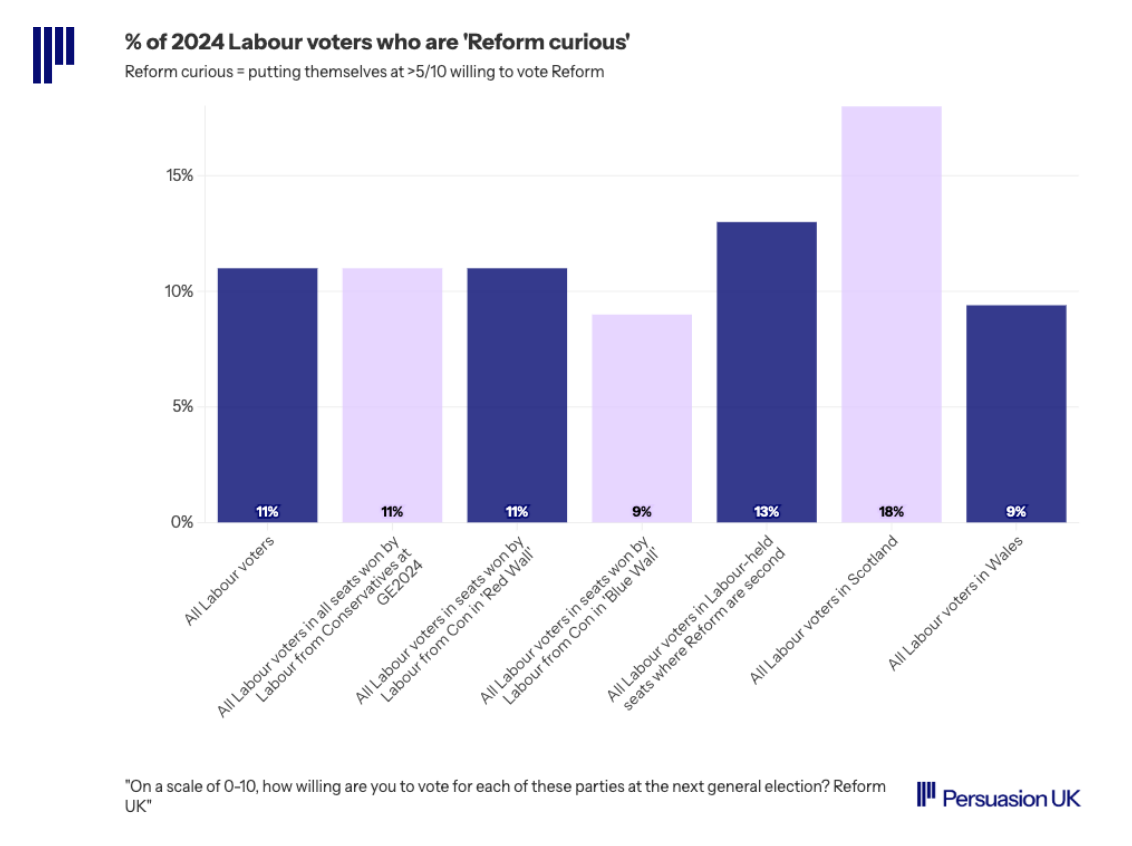
The British electorate voted for change. (And if you had to live inside of Britain's funhouse mirror political system for the last decade, who would blame you?). In response Starmer promised that he would give them more of the things that they had voted against.
"the message I take out of these elections is that we need to go further and we need to go faster on the change people want to see. And that’s what I’m determined to do.”
This is bad politics, as well as bad thinking.
If Opposition party leaders losing their own seats is commonplace, will the UK try to go one better?

